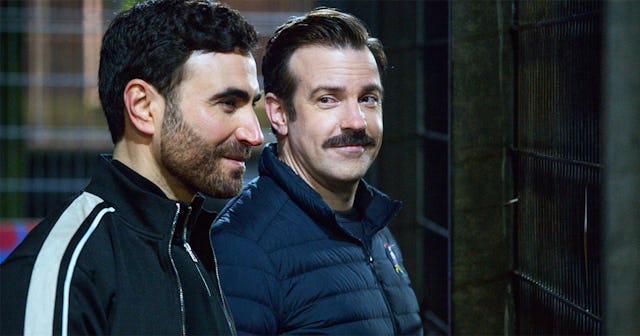Why I'm So Nervous About The 'Ted Lasso' Season Finale

Spoiler alert: We’re just gonna go ahead and assume that y’all have been watching Ted Lasso.
If you aren’t, consider this the kick in the pants you need to get going. I mean, seriously, what the world are you waiting for? And if you have been watching (and of course, you’ve been watching because the whole world is watching), then you know that this show is pure genius. It is a national treasure, and a gift to all humankind. And I don’t say that lightly.
Ted Lasso isn’t just a glittering gem of television entertainment, it is an absolute game-changer when it comes to mental health. In season 2, the show has really dug into Ted’s mental health challenges and normalized the value of therapy with the role of Dr. Sharon Fieldstone as the team’s therapist. The show has addressed panic attacks, anxiety, and suicide, along with tools for tending to one’s mental health like controlled breathing, meditation, and talk therapy. In other words, the show has made it okay to not be okay.
But the show doesn’t just address mental health – that alone wouldn’t make it revolutionary – but it’s the way it does it that is so refreshing and, honestly, long overdue.
In Season 2, Dr. Fieldstone is hired as the team’s therapist to help a number of the athlete’s address mental health challenges. So often, we talk about the physical demands on athletes, but we rarely (if ever) see an open acknowledgement of the emotional and mental issues that they are dealing with not just as athletes, but as humans. There is this stereotype that mental health struggles equal weakness or vulnerability, one that is even more pervasive among athletes. In fact, this past summer, I saw someone I had once respected from my days as a college athlete blast Simone Biles on Facebook for prioritizing her mental health. I was disappointed and sad and fucking angry. (Cue my inner Roy Kent, growling and dropping a shit-ton of F-bombs.) I thought about leaving a comment on the post, telling him how gross his message was, but I didn’t. You know, to protect my own mental health and all.
The other reason Ted Lasso is so revolutionary is because the ones seeking Dr. Fieldstone’s help are all men. Data shows that men are far less likely to get professional help for their mental health challenges. As reported by the Guardian, a survey commissioned by the Mental Health Foundation in the U.K. found that men far less likely than women to seek professional mental health support and also less likely to talk about a mental health problem with friends and family. As Bustle explains, when men are three times as likely to die by suicide as women, making their reluctance to seek mental health support particularly serious.
AppleTV
Anecdotal evidence bears this out as well, because I don’t know about you, but I know very few men who open admit to their own challenges with anxiety or depression. When they do talk about it, it’s in hushed tones. They prefer to keep it a secret or pass it off as something else. Which was Ted’s response at first too – and why this week’s episode has sparked so much anxiety in me.
Honestly, just thinking about the way the show will handle Ted’s reaction to the public knowing about his panic attack and anxiety disorder is giving me anxiety. And I don’t mean in a hyperbolic sense. I am legit anxious about whether or not Ted will deny it or own it. The former runs the risk of perpetuating the stigma, but the latter will stomp on that stigma and kick it right out the door.
Knowing the way the show has handled anxiety disorder and mental health issues in general up to this point, I’m hopeful and optimistic that it will be done with grace, kindness, and a healthy dose of humor. But still I’m anxious. Because if Ted denies his panic attack, if he denies his anxiety disorder, what does that mean for the rest of us?
The show has already done so much to address the stigma associated with mental health, anxiety and depression, and the benefits of therapy. It would be a real shame for it to stop short.
AppleTV
As someone who has experienced bouts of depression and anxiety at various points in my life, as someone who has been in therapy off and on for the past five years, and as someone raising two sons to be emotionally self-aware individuals who prioritize their own mental health and don’t fall for the stigma that struggling with mental health is a “weakness, I appreciate what Ted Lasso has done to remove mental health stigma and stomp out toxic masculinity in general. Each week, we watch the show as a family – me, my husband, and my two sons. We laugh, we cry, and we all get one step closer to prioritizing our mental health and displays of emotion — as we should be.
There is so much potential here. Ted Lasso has captivated us all, and brought mental health to the forefront with kindness, empathy, and just the right amount of humor. Ted Lasso isn’t just a delight (though it is certainly that), it is a radical approach to demystifying and de-stigmatizing anxiety, depression, and mental health issues in general. It is literally changing the way we treat, talk about, and even think about our emotions and feelings. Which is why I’m feeling anxious about how they’ll deal with the public knowledge of Ted’s anxiety. Maybe I’ll take Dr. Fieldstone’s advice and try some 4-7-8 breathing exercises.
Please, Ted Lasso, don’t let us down now.
This article was originally published on